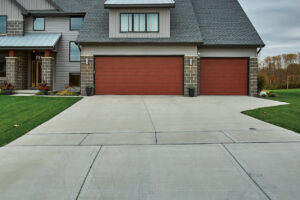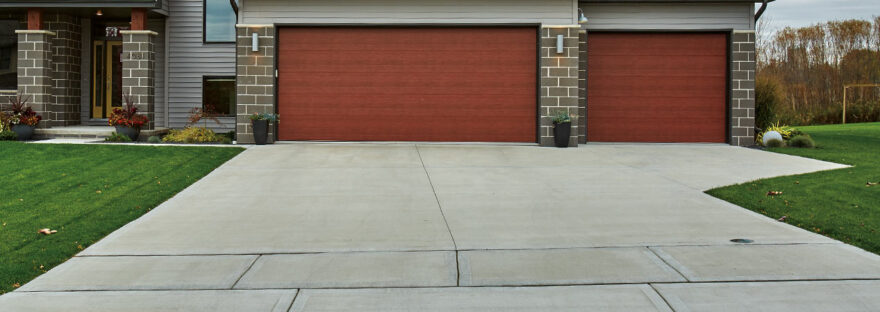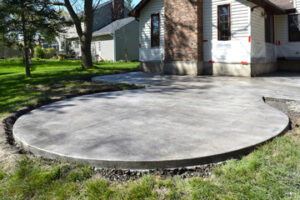Driveway Replacement Colorado Springs is more than just a pathway to your car; it can boost curb appeal and add value to your home. Minor problems can usually be repaired, but replacing the surface may make more sense if the surface is beyond repair.
From understanding your options to choosing the right professional, here’s what you need to know about driveway replacement.

Your driveway is poured to direct water runoff away from your home, but the movement of vehicles across the concrete and asphalt can cause cracks. These small hairline fissures may seem harmless but can worsen over time. Eventually, they will open up enough for dirt, debris, and other materials to seep in, and vegetation like weeds and grass can take root and further damage the surface of your driveway.
The best way to repair cracks in your concrete driveway is by performing preventive maintenance regularly. Inspect your driveway for cracks wider than a hairline and perform the necessary repairs. If you notice a large area of cracking or multiple cracks that wiggle and shake when you walk over them, it’s best to call a concrete or foundation repair specialist to make the necessary repairs.
Wash the affected area using a pressure washer when repairing hairline and minor concrete cracks. This will help remove any dirt, grime, or stains interfering with the bonding process and make your repairs less effective. Once the area is clean, spray it with cleaning products and allow it to dry completely. Doing this during a stretch of warm, sunny days is best so the crack filler can cure quickly and effectively.
While it is possible to perform concrete and asphalt crack repair independently, if the cracks are too wide to fill with a DIY kit, you should call a professional for concrete or foundation repairs. These specialists can perform dry packing, epoxy injections, sealing, and routing to stop your driveway cracking before it causes serious structural damage.
A cracked driveway can be a tripping and safety hazard for people and pets. In addition, if the cracks become too wide, they can change the water flow, redirecting it back toward your home’s foundation, a condition known as hydrostatic pressure that can cause your foundation walls to bow. To repair these problems, you can use a structural repair product that is easy to shape and mold into the contour of your driveway.
Potholes in your driveway can cause serious damage to cars and aren’t very pleasant to drive over. They can also be dangerous for small children and pets, so addressing them quickly is a good idea.
Depending on the severity of the issue, you may be able to repair your driveway by filling in the cracks, or you may need to replace it completely. A reputable paving professional can help you decide what is the best solution.
The easiest way to fix potholes is to remove loose debris and gravel from the hole. You can use a shovel or a rake to do this. Then, you can fill the hole with coarse gravel at least three inches deep. The gravel should be tamped down using a commercial tamper or a homemade substitute. This process will help compact the rough gravel, preventing water from seeping under the surface and creating more potholes in your driveway.
You can use an asphalt patch to fill the hole if you have a paved driveway. Before doing so, however, it is important to clean the area and heat it with a flame torch. This will ensure the patch material will bond to the surrounding asphalt and last longer. Using a plate compactor for larger repairs is also important because it will push the patch into place and compress it to make it last.
Even if you don’t have any major damage to your driveway, it is a good idea to get it checked out regularly. This will allow you to catch any problems before they become too big to be repaired. It is also a good idea to fix any cracks before winter, as this is when they will most likely expand.
Another good tip for preventing potholes is regularly removing weeds and tree roots from your driveway. This will prevent them from growing and pushing the surface of your driveway up. This will also help keep the soil from eroding under your driveway and causing it to sink into holes and cracks.
Rust stains are a common problem with concrete surfaces, and if left unchecked, they can leave your driveway looking shabby. They’re usually caused by things like metal garden tools and furniture and can be particularly difficult to remove from concrete if they’ve been there for some time. However, you can eliminate rust stains on your concrete with effort and elbow grease.
For light stains, lemon juice or white vinegar is often enough. Just pour some liquid on the stain and allow it to sit for about ten minutes before scrubbing vigorously with a scrub brush. Rinse and repeat if needed. For moderately stubborn stains, a commercial rust cleaner may be necessary. Ensure you follow the manufacturer’s directions for application and work in a well-ventilated area with appropriate protection, such as safety gloves and glasses.
If your rust stains are severe, you may need to use a stronger acid, such as trisodium phosphate or hydrochloric acid, for more heavy-duty treatment. These products are available at home improvement stores and must be mixed with water to avoid an adverse chemical reaction. Apply the product as instructed and let it sit for a few minutes before scrubbing with a nylon bristled brush and rinse thoroughly with clean water.
Once you’ve removed the rust stains, sealing your concrete is a good idea to prevent future problems. A quality epoxy sealer will help your driveway resist stains and keep it looking great for years.
While rust staining can be unsightly and sometimes difficult to remove, the damage is usually not serious. However, if you don’t take steps to get the problem under control, it could become much more severe and require costly repairs or replacements. If you need help treating the issue, consider hiring a professional who can handle it quickly and effectively. They’ll also be able to provide advice on how to prevent rust stains from forming in the first place. They’ll have the proper equipment and supplies to get the job done right and will be able to apply a protective coating that will prevent future problems from occurring.
There’s a lot of debate on whether to invest in curb appeal upgrades like silky smooth concrete or rustic lanterns to accent your front entrance. The answer is it depends on your goal. For homebuyers, the driveway is often their first impression of your house and yard and can majorly impact buyer interest. For this reason, your real estate agent should guide you on what upgrades are appropriate for your specific market.
A fresh coat of paint on your front door, a well-maintained landscape, and a clean driveway and walkway are essential in creating an inviting entryway for guests, friends, and neighbors. A fresh and appealing look also helps to set your property apart from the rest, boosting its value and potential sales turnaround.
Many people need to think more about their driveways, but a good-looking, updated driveway and front walk can make or break your home’s curb appeal. The first step is to objectively examine your current driveway and front walk and determine if it needs repair or replacement. This can be done by taking photos or asking for a friend’s opinion. Once you decide what to do, start collecting inspiration in an idea book or folder and create a list of pros to contact.
When replacing your driveway, choosing the right material is an important consideration. Using inferior materials will reduce your curb appeal and may result in costly repairs. Be sure to ask your pro about the quality of their work and request before-and-after pictures of previous projects for full peace of mind that you’re getting a top-quality product.
Decorative pavers are a great way to add style and personality to your driveway and enhance its durability. Choose a color and pattern that complements your architectural style, landscape, and neighborhood. A new paver sidewalk can also provide a welcome aesthetic to your front entryway and improve safety by marking the boundary between paved and unpaved areas of your property.



